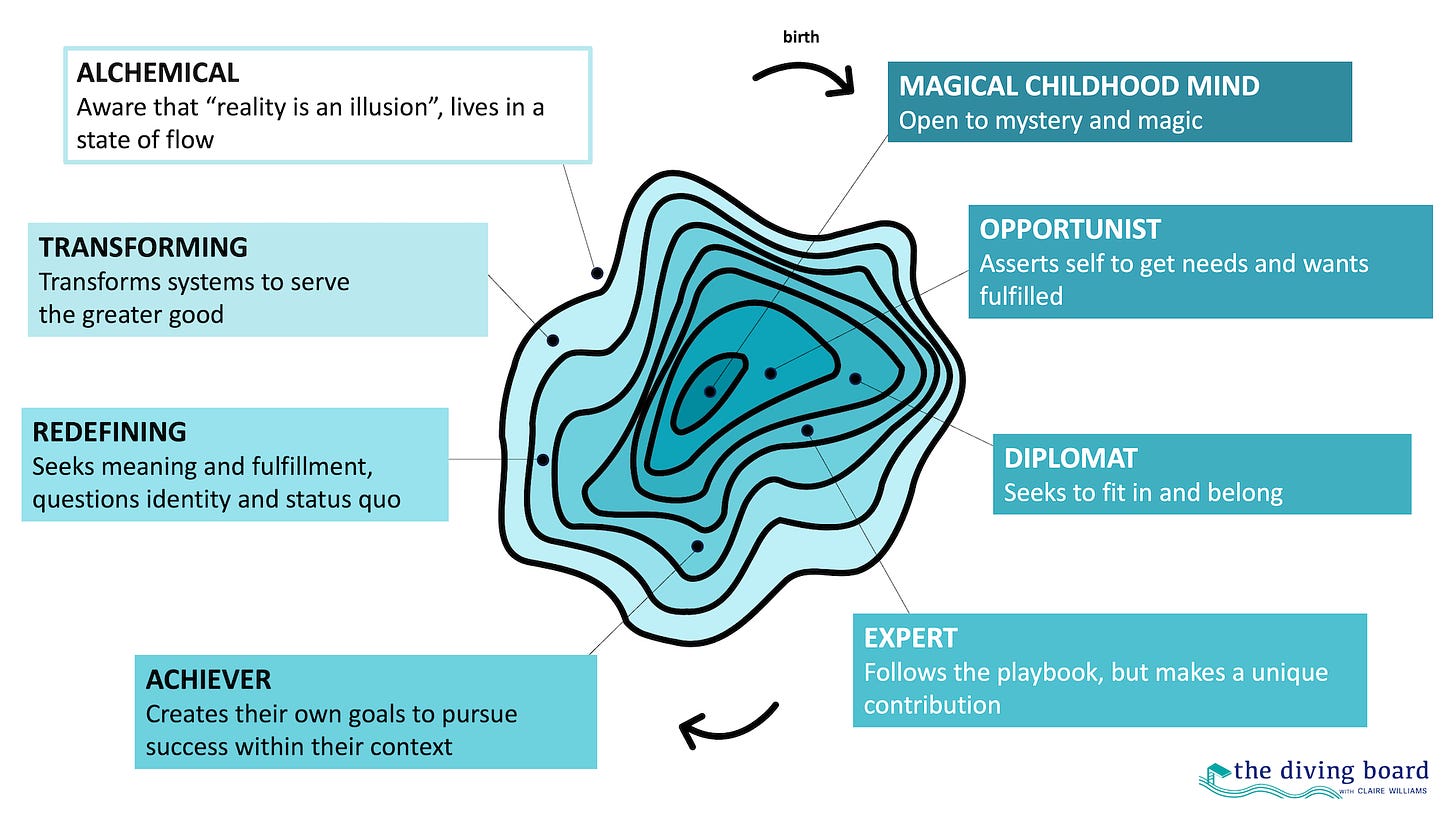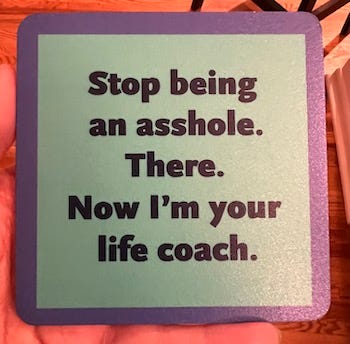🌊The Plunge #4: Be a Stage Sage (Vertical Development Part 3)
Plus, a life coaching PSA from me to you, my new favorite movie, and cubicles
Any amateur chefs out there? Ever made a wine reduction? Here’s how it works: you pour some wine into a saucepan over medium-high heat and simmer until most of it evaporates, leaving you with a sticky, flavorful sauce that makes that beef tenderloin SING. (Mmmm, who’s hungry?)
That’s what I’ve been trying to do in this series: take 3 cups of Vertical Development and boil it down to its essence, giving you 3 yummy tablespoons of sticky, memorable growth food, with all the good flavor minus the overwhelm. (As for the beef tenderloin…you’ll have to cook that yourself, then invite me for dinner, k?)
Today is the final post in our Vertical Development Series. If you didn’t catch Part 1 and Part 2, give them a read first.
Let’s dive in.
Like my goldendoodle’s groomer, I’m cutting the fluff and getting right down to the skinny today. Here’s what we’ve learned together so far in this series:
Vertical Development is the way our meaning-making changes over time, allowing us to see more, do more, and become more.
This development happens through a progressive series of Mindset Stages.
Think of yourself as a territory on a map, starting out in the center, then crossing boundaries into new terrain. As you evolve through each Mindset Stage, you get to explore more of yourself and access capacities that have previously been hidden within you. (Way to go, you little adventurer, you!)
Finally, we left off last time with this treat – a map of all the Mindset Stages:

Craving a more thorough description of the stages (in addition to craving beef tenderloin)? I made you this.
This Is How It Happens
So how do people move through these Mindset Stages? What triggers growth? Can we skip a stage? Should you be striving to reach the Alchemical stage before you go to heaven?
Here’s what to know1:
Each stage holds gifts and limitations. Later stages are not better or worse. They just contain different possibilities.
Stage shifts happen when our current mindset is no longer a good match for our context. Life or work throws us some new level of complexity, and we can either respond by staying where we are or by engaging the growth process.
Each stage builds on the stage before, so you won’t skip over stages. No hopscotch.
Almost no one goes through all the stages. Most people reach a mid-range stage and remain there, because that stage is a perfect match for their life and work context.
The boundaries between stages are fluid. We can reach back and even lean forward, both consciously and unconsciously (more on that later). But we typically have an overall “center of gravity” that hovers near one stage, or perhaps between two.
We should integrate – not reject - the gifts of earlier stages as we expand into later stages.
Let’s Zoom
I’m not inviting you to a videoconference. I know y’all are tired of that.
I mean, “Let’s zoom in on a couple of Mindset Stages that are probably relevant to you at work.” I wish we could double-click on all the stages today, but we’ll keep it simple with a “for example” look at just two: Achiever and Redefining.
The most common Mindset Stage found in high-performing established professionals is Achiever.
Gifts: Creates, pursues, and executes own goals; Can rally others to achieve results
Limitations: Focus on success and individual achievement may prevent them from challenging status quo and connecting to deeper purpose; Risk of over-work
For Example: A leader or strong individual contributor intent on knocking it out of the park.
Let’s pause there. Can you appreciate how helpful the gifts of the Achiever Mindset are to succeed and further your career? Dopamine hits from getting good shit done are the currency of this mindset.
Now, can you imagine what it’s like to be in Achiever Mindset, and to start asking questions like, “Why am I doing this? Do I even care about this work anymore? Is there something more meaningful I could be doing?” Or to start shifting more energy into questions and exploration rather than goals and achievement? When this happens, the Redefining stage may be knocking at your door.
Gifts: Redefines success to pursue meaning and fulfillment over achievement; Questions the status quo; Can deal with abstractions and seemingly opposing viewpoints
Limitations: Can be overly absorbed by questions and less focused on action; May feel “lost” sometimes
For Example: A previously energetic high performer who wonders if they’re burning out or having a mid-life crisis.
The Achiever-to-Redefining Shift can feel like a major WTF moment for a lot of people. (This happens to be the subject of the book I’m writing!) And yet, the Redefining Mindset, if embraced, can lead to more fulfillment in work and life, savvier problem-solving and innovation, and more inspiring leadership.
Be a Stage Sage
And now to that all important question you’ve been waiting to get to for the better part of 3 posts: When people hate on Taylor Swift, what is their actual problem, and how can we help them2?
Ope, wrong person. That was meant to be a text to my friend Danielle.
I meant: What the heck can I do with all this Vertical Development theoretical mumbo-jumbo, Claire?
Read on, Young Jedi.
Know Thyself. You might already know your Myers-Briggs personality type as well as your shining Strengths and biggest “Opportunities”. (You had to write something down in those boxes on your last Annual Performance Review.) Vertical Development adds a new way to understand yourself, beyond personality and style, to help you be more self-aware, less judgmental, more flexible, and more effective (score!). Read about all the Mindsets here, or consider taking the Vertical Mindset Indicator3.
Channel Gifts, Minimize Risks. When you know your go-to Mindset Stage, you can be intentional about letting those good qualities soar while being careful of your Mindset’s pitfalls.
Increase Your Mindset Range4. No Mindset is better or worse, but some Mindsets are better suited to certain situations. Watch this short video to learn how to stretch forward and try on later-stage Mindsets and intentionally reach back to leverage the gifts of earlier-stage mindsets5.
Work Better with People at Different Mindset Stages. That colleague you have who’s always bringing up “purpose” and “the why”…are they full of shit? Maybe not. They might be operating from Redefining or Transforming Mindset. That detail-obsessed team member who can’t see the forest for the trees…are they hopelessly near-sighted? Nope…they might be operating from Expert Mindset. Vertical Development helps you understand your colleagues and meet them where they are.
When Complexity Goes Up, Grow With It. I’m not advocating growth for growth’s sake. I also don’t believe you can “make” Vertical Development happen. But when life or work throws more complexity at you than you can currently navigate, it might be an invitation to vertical growth. You can choose to engage that growth; here’s a great resource on how to do that.
See Your Organization’s Mindset Stage. Yep, these Mindsets show up collectively, not just individually. When you are operating at an earlier or later Mindset Stage than your organization (or team), you might feel a tension or mismatch. This is normal, and it doesn’t mean you need to quit. It just means you need to navigate that mismatch with awareness and skill.
Whew!
We did it! Thanks for following along through this Vertical Development trifecta of posts. I hope this sticky, rich sauce pairs great with whatever you eat on your lunch break today. A few final thoughts:
I already bring Vertical Development into organizations, but writing these posts has made me want to offer something for solo learners, too. Not sure what yet - a Coaching Circle, a Self-guided Course, a Workshop Series? Let me know in the comments what kind of offering might interest you!
I do plan to turn this series of posts into a whitepaper or article you can easily download and share, so stay tuned for that!
For those who want to keep digging into this topic, here’s a list of my top Vertical Development Recommended Resources.
High fives all around. Thanks for being here.
Sources: The work of Robert Kegan, Jennifer Garvey Berger, Bill Torbert, Susanne Cook-Greuter, Nick Petrie and Jan Rybeck has deeply informed the theory and language of all three Vertical Development posts. Many thanks to them all!
🎤 Did reading about that Achiever-to-Redefining shift above feel familiar? Would you like to explore it more? In April, I’ll be speaking at the virtual Center for Coaching in Organizations Summit on this very topic. My session is called The Missing Piece of the Burnout Puzzle, which also happens to be the topic of the book I’m writing. I’d love to see you there. Plus - lots of other great speakers are on the Summit line-up!
🧑🏾💻 If I were still working inside an organization I’d be passive-aggressively leaving this article lying around by the water cooler: Bring Back Cubicles! I do not understand how people achieve anything resembling deep focus in an open office environment. What’s your take?
Found this coaster in a gift shop recently, and I think by posting an image of it here, my work is done for the day:
🍿 Do not watch another second of any other media until you and some loved ones pop a giant bucket of popcorn and watch Matilda the Musical on Netflix. It’s a beautiful, deeply moving film with fantabulous music, top-notch acting (Emma Thompson!), and stunning character development. You will cheer, you will weep, you will sing, you will thank me.
I was fortunate to spend some time at my friend’s cabin recently for an amazing winter retreat, complete with sauna, fog-drenched frozen lake, communal meals, and spiritual conversations. Also, I slept a LOT. Hope you can find a way to restore your soul this month, my friend. ❤️ February Funk is a real thing.
📚 Next up on my TBR (To Be Read) List (many thanks to those of you who inspired some of these ideas in your comments on my 2023 in Books post): Demon Copperhead; I Miss You When I Blink; The Kingdom, The Power, and The Glory, and Slow Productivity. Gah, just seeing those titles makes me want to ditch my work for today, make a pot of tea, and snuggle up on the couch with these exact books for company. I mean, I did life coach a bunch of people already with that coaster, so I think I’ve earned it?
See you next time on The Diving Board! And whatever I write about, I can assure you of this: it will be a whole lot lighter than Vertical Development. I’m ready to switch it up!
Now, get back in there.
A caveat. Do I think Vertical Development is powerful and real? Yes. Do I implicitly believe it represents the undeniable reality of how development unfolds for all humankind? Probably not. I think there’s much we don’t understand yet. For instance, while Vertical Development is well-researched in Western contexts (including in global organizations, which are largely modeled after Western ideals even when located in non-Western contexts), not enough research in non-Western contexts exists for us to declare this a universal truth. So take what’s useful, but stay open-minded.
I realize I make a lot of Taylor Swift references. Sorry not sorry. Also, NEW ALBUM DROPS 4/19/24!!!
The VMI is an AI-based assessment I use with leaders and teams. (And if you’d like me to be your assessment debrief coach, just email me at claire@goingindepth.com.)
The concept of “Mindset Range” comes from Jan Rybeck and Nick Petrie
One way I wish we’d all reach back? Going all the way back to the beginning and reconnecting with our Magical Childhood Mind – that part of us that once felt inherently connected and whole. If we expand into later-stage Mindsets while losing touch with that original wholeness….we’re missing something crucial. My thinking on this has been heavily influenced by the work of Spring Cheng.












You said you'd simplify the complex conversation around Horizontal and Vertical Development, and you did so masterfully, so thank you. I thoroughly enjoyed learning about this, and truly, I'm not all that into learning new stuff. Bravo!
Re: Bring Back Cubicles!. I had cubicle gigs from '95 - '98, one in the dingy basement of a miserably hellish "agency" in Coon Rapids called JAM Advertising, and then another at Northern Tool & Equipment working on catalog copy, surrounded by other mostly fun, young people, and perfecting my foos game. Since then, I've been lucky enough to have sweet office gigs at the old Colle + McVoy agency overlooking Normandale Lake, Foley Sackett (now Level) right near the Mississippi, the old Carmichael Lynch building in the Minneapolis Theater District, the old BBDO space atop the 5th Street Towers overlooking everything, FAME with another spectacular city view, Riley Hayes (now Riley) again with the mighty Mississippi right outside my window, and now my very own quaint orange office at Club Crystalé, just a few feet from my bedroom with a view of the Amazon delivery truck in front of my house. I realize I've been so blessed because I'm not sure I ever truly deserved the cool office spaces I've had. But the idea of an open office plan has always pained me deep to my soul — I'll never forget when one agency owner threatened to implement one — as a director at the time, I shared my very pointed thoughts on the subject. As a writer, I just can't listen to music when I think or write — besides, I've never felt very comfortable with anything over or in my ears for long periods of time anyways. Sure, I love being around others and collaborating, of course, there's always a time for that. But, let's face it, the work's gotta get done, and sometimes it needs to happen behind closed doors, or at very least, behind fuzzy grayish blue walls.
Thanks for always inviting chatter, even when it's rambly and senseless!